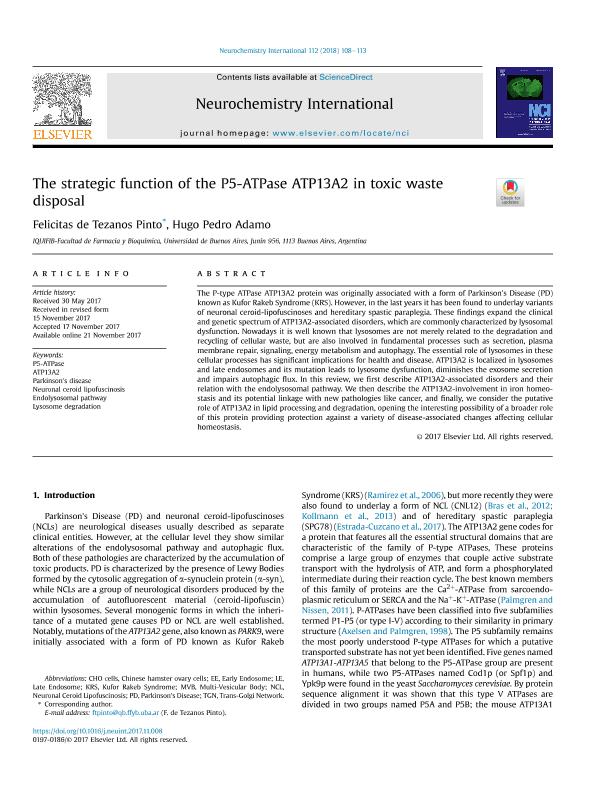Mostrar el registro sencillo del ítem
dc.contributor.author
de Tezanos Pinto, Felicitas

dc.contributor.author
Adamo, Hugo Pedro

dc.date.available
2018-06-06T15:52:02Z
dc.date.issued
2017-11
dc.identifier.citation
de Tezanos Pinto, Felicitas; Adamo, Hugo Pedro; The strategic function of the P5-ATPase ATP13A2 in toxic waste disposal; Pergamon-Elsevier Science Ltd; Neurochemistry International; 112; 11-2017; 108-113
dc.identifier.issn
0197-0186
dc.identifier.uri
http://hdl.handle.net/11336/47477
dc.description.abstract
The P-type ATPase ATP13A2 protein was originally associated with a form of Parkinson´s Disease (PD)known as Kufor Rakeb Syndrome (KRS). However, in the last years it has been found to underlay variantsof neuronal ceroid-lipofuscinoses and hereditary spastic paraplegia. These findings expand the clinicaland genetic spectrum of ATP13A2-associated disorders, which are commonly characterized by lysosomaldysfunction. Nowadays it is well known that lysosomes are not merely related to the degradation andrecycling of cellular waste, but are also involved in fundamental processes such as secretion, plasmamembrane repair, signaling, energy metabolism and autophagy. The essential role of lysosomes in thesecellular processes has significant implications for health and disease. ATP13A2 is localized in lysosomesand late endosomes and its mutation leads to lysosome dysfunction, diminishes the exosome secretionand impairs autophagic flux. In this review, we first describe ATP13A2-associated disorders and theirrelation with the endolysosomal pathway. We then describe the ATP13A2-involvement in iron homeostasisand its potential linkage with new pathologies like cancer, and finally, we consider the putativerole of ATP13A2 in lipid processing and degradation, opening the interesting possibility of a broader roleof this protein providing protection against a variety of disease-associated changes affecting cellularhomeostasis.
dc.format
application/pdf
dc.language.iso
eng
dc.publisher
Pergamon-Elsevier Science Ltd

dc.rights
info:eu-repo/semantics/openAccess
dc.rights.uri
https://creativecommons.org/licenses/by-nc-nd/2.5/ar/
dc.subject
P5-Atpase
dc.subject
Atp13a2
dc.subject
Parkinson'S Disease
dc.subject
Neuronal Ceroid Lipofuscinosis
dc.subject
Endolysosomal Pathway
dc.subject
Lysosome Degradation
dc.subject.classification
Otras Ciencias Biológicas

dc.subject.classification
Ciencias Biológicas

dc.subject.classification
CIENCIAS NATURALES Y EXACTAS

dc.title
The strategic function of the P5-ATPase ATP13A2 in toxic waste disposal
dc.type
info:eu-repo/semantics/article
dc.type
info:ar-repo/semantics/artículo
dc.type
info:eu-repo/semantics/publishedVersion
dc.date.updated
2018-06-04T17:18:44Z
dc.journal.volume
112
dc.journal.pagination
108-113
dc.journal.pais
Estados Unidos

dc.journal.ciudad
Amsterdam
dc.description.fil
Fil: de Tezanos Pinto, Felicitas. Consejo Nacional de Investigaciones Científicas y Técnicas. Oficina de Coordinación Administrativa Houssay. Instituto de Química y Físico-Química Biológicas ; Argentina
dc.description.fil
Fil: Adamo, Hugo Pedro. Consejo Nacional de Investigaciones Científicas y Técnicas. Oficina de Coordinación Administrativa Houssay. Instituto de Química y Físico-Química Biológicas ; Argentina
dc.journal.title
Neurochemistry International

dc.relation.alternativeid
info:eu-repo/semantics/altIdentifier/doi/http://dx.doi.org/10.1016/j.neuint.2017.11.008
dc.relation.alternativeid
info:eu-repo/semantics/altIdentifier/url/https://www.sciencedirect.com/science/article/pii/S0197018617303017
Archivos asociados
